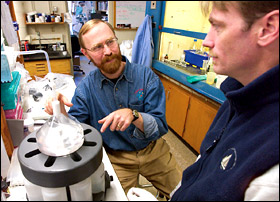
|
 |
Research > Research
Departments > Marine Chemistry & Geochemistry
Marine Chemistry & Geochemistry
Overview | Awards
& Recognition | Photos
 |
 |
| Ken Buesseler,
chair of the Marine Chemistry and Geochemistry Department
(left) and Postdoctoral Scholar Carl Lamborg are members
of Café Thorium, the nickname for the MC&G Radiochemistry
Group, which measures trace radioactive elements for a
wide range of studies. (Photo by Tom Kleindinst) |
Scientists and staff in the Marine
Chemistry and Geochemistry Department (MC&G) assemble pieces
of the puzzle that help us understand the ocean and its role
in supporting life on Earth. We study chemical exchanges across
the boundaries where ocean meets land, seafloor, and atmosphere,
seeking insights into ocean processes driven by natural cycles
and human-induced changes to our planet.
With evidence from chemical changes in seafloor
sediments, for example, Konrad Hughen and colleagues correlated past drought conditions with the
collapse of the Mayan civilization. The work was
highlighted in Science magazine and on a Nova television program in 2003.
The oceans directly influence climate by transporting heat via
vast ocean currents, and by sustaining marine plankton, which
form the base of the ocean food web. As plankton grow, they
absorb atmospheric carbon dioxide—a natural, but now increasing,
greenhouse gas. When they die, plankton sink, transporting carbon
to the deep sea. Through this biological pump, the oceans take
up roughly one third of the carbon released to the atmosphere
by human activities, such as the burning of fossil fuels.
Many MC&G scientists explore the ocean carbon cycle. Some study complexities of the biological
pump (Roger François, Bill Jenkins, Ken Buesseler). Others study the air-sea exchange of greenhouse
gases (Nelson Frew, David Glover). Scott Doney incorporates these data into sophisticated models of the
ocean carbon cycle. MC&G also houses the main science and data management offices of the Joint Global
Ocean Flux Study (JGOFS), the largest ocean carbon scientific program to date.
Beyond sunlight and nutrients, growing plankton also need trace
quantities of metals. Research in this field by Jim Moffett
has been expanded with the addition of Mak Saito as a new assistant
scientist in 2003. Mak uses molecular techniques to fill an
important gap in our understanding of how trace metals control
plankton growth and influence ocean productivity.
In the sunless depths, where photosynthesis is
not an option, chemosynthesis reigns. Studying deep
ocean cores, Wolfgang Bach, Katrina Edwards, and
colleagues are examining how chemosynthetic microbes, living deep below the seafloor, chemically alter
the ocean crust.
MC&G’s expertise in oil and natural gas sources and sinks was called into action when a barge spilled up to 98,000 gallons of fuel oil in nearby Buzzards Bay on April 27, 2003. The broad knowledge and rapid response of Chris Reddy and colleagues provided invaluable understanding of the extent of the contamination and longer-term fate of the spilled oil.
In 2003, Mark Kurz stepped down as Chair, and Ken Buesseler was appointed to succeed him. During Mark’s term, MC&G expanded into exciting new research areas, including marine microbiology and biogeochemistry, while simultaneously preserving its strengths in classic marine geochemistry, the cycling of dissolved organic matter, hydrothermal systems, sedimentary diagenesis, applications of stable isotopes and radionuclides as tracers, paleoceanography, and chemical alterations in the “subterranean estuary,” where groundwater and ocean water meet at the seashore.
—Ken Buesseler (kbuesseler@whoi.edu)
Department Chair
|
|
